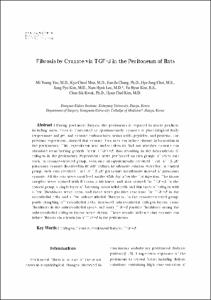Fibrosis by Cyanate via TGF-β in the Peritoneum of Rats
- Keimyung Author(s)
- Mun, Kyo Cheol; Kwak, Chun Sik; Kim, Sang Pyo; Kim, Hyun Chul
- Department
- Dept. of Biochemistry (생화학)
Dept. of Pathology (병리학)
Dept. of Internal Medicine (내과학)
Kidney Institute (신장연구소)
- Journal Title
- Keimyung Medical Journal
- Issued Date
- 2004
- Volume
- 23
- Issue
- 1
- Keyword
- TGF-β
- Abstract
- During peritoneal dialysis, the peritoneum is exposed to waste products including urea. Urea is Converted to spontaneously cyanate at physiological body temperature and pH, and cyanate carbamylates amino acids, peptides, and proteins. Our previous experiment, showed that cyanate from urea can induce chronic inflammation in the peritoneum. This experiment was under taken to find out whether cyanate can stimulate transforming growth factor (TGF)-β, thus resulting in the biosynthesis of collagen in the peritoneum. Experiments were performed on two groups of sever rats each. In cyanate-trected group, each rats intraperitoneally received 1 mL of 1.5µM potassium cyanate dissolved in 40mM sodium bicarbonate solution everyday. In control group, each rats received 1mL of 1.5µM potassium bicarbonate instead of potassium cyanate. All the rats were sacrificed on the 85th day after the 1st injection. The tissue samples were stained with Masson’s trichome, and also stained for TGF-β. In the control group, a single layer of flattening mesothelial cells and thin layer of collagen with a few fibroblasts were seen, and there were positive reactions for TGF-β in the mesothelial cells and a few submesothelial fibrocytes. In the cyanate-trected group, partly sloughing off mesothelial cells, increased submesothelial collagen layers, many fibroblasts in the submesothelial space, and many TGF-β positive fibroblasts among the submesothelial collagen layers were shown. These results indicate that cyanate can induce fibrosis via stimulation of TGF-β in the peritoneum.
- Publisher
- Keimyung University School of Medicine
- Citation
- 여미영 et al. (2004). Fibrosis by Cyanate via TGF-β in the Peritoneum of Rats. Keimyung Medical Journal, 23(1), 18–23.
- Type
- Article
- Appears in Collections:
- 2. Keimyung Medical Journal (계명의대 학술지) > 2004
1. School of Medicine (의과대학) > Dept. of Biochemistry (생화학)
1. School of Medicine (의과대학) > Dept. of Internal Medicine (내과학)
1. School of Medicine (의과대학) > Dept. of Pathology (병리학)
3. Research Institutues (연구소) > Kidney Institute (신장연구소)
Items in Repository are protected by copyright, with all rights reserved, unless otherwise indicated.
